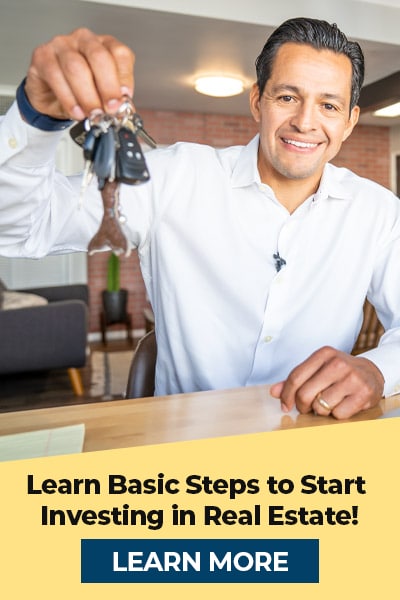One of the main reasons people get into Real Estate investing is to build wealth through passive income. Creating positive cash flow from the properties you own can be difficult and there are lots of things that can get in the way of being profitable.
Today, we’ll tackle some of the top questions that we are asked when it comes to getting started in the real estate investing world. A large part of deciding whether to pour capital into Real Estate is coming to terms with your own expectations. With real estate investing, there is actually less risk than there is with conventional stock investing. Savvy investors know they can leverage the bank’s money when investing in a rental property, allowing them to take less risk. Some investors pay as little as $13,500 for a down payment on their first duplex investment property, provided they agree to live in one of the units and receive FHA financing.
The best advice we can give is to seek out a mentor who has proven themselves in the real estate industry and pick their brain, ask them how they got started investing. Patience is always your ally when it comes to wisely investing your money, so don’t rush the process.
What’s the difference between investing in stocks and real estate?
The big difference when comparing stocks and real estate is that when you buy real estate you are able to use the bank’s money, whereas when you invest in stocks, you must use your own money. This is referred to as leverage. As the property value goes up, the owner still makes money through rent which really increases the rate of return for the real estate owner more so than it would in stock. Additionally, when you factor in leverage, your cash-on-cash return will also increase.
What is inflation and how does it relate to real estate investing?
Inflation is something that happens every single year. What we pay for milk and bread typically goes up. What we pay for gas also typically goes up. Most importantly, when you own real estate, it keeps up with inflation so you are never falling behind in that investment vehicle.
Inflation also plays a large part in determining what kind of investments to make. With real estate investing, the valuation of your assets increases every year just as inflation does. This proves to be an increasingly wise move, considering that with saved cash money there is no way to recoup inflation losses every year. Even for those would-be investors who are afraid of financial commitment, cosigning on a property with a business partner(s) will help you get better payments and assume less risk overall.
While there are certainly risks associated with becoming a real estate investor, such as loss of money, overpaying for a building, or uncooperative tenants, there are plenty of reasons to invest now.
If your money is sitting in the bank, you are actually losing money. The bank is going to pay you a very small return on your savings, but the actual cost of living goes up every single year by a certain percentage. This means that if you have money in the bank, you are falling behind every single year. Finally, the best part of owning real estate is that it keeps up with inflation.
How much money do I need to get started investing in real estate?
We did our research and found that in the City of Long beach, the lowest-priced duplex this year sold for $270,000. If a buyer wanted to purchase that property and they qualify for what’s known as FHA financing, which would require them to live in one of the units, the down payment for that property would be $13,500, or 5% of the purchase price. In this situation, that is the amount of down payment one would need to be able to qualify for their first property.
The amount of down payment always depends on the purchase price and the strength of the borrower. What does that mean? When you speak with your lender they will run your credit to see where it’s at, look at your income, look at your debt coverage ratio, and look at how much income you earn and how much debt you have. Finally, they use this to help determine the amount you qualify for and the down payment of the property which varies with every single building.
Can I invest in real estate with zero money down payment?
Realistically you can’t do such a thing unless you’re an active or former member of the United States Military. The only way we’ve heard of people being able to purchase a property with zero payment down is through VA Home Loans with the Department of Veterans Affairs.
Can I buy my first investment property with a friend or partner?
Yes, we see that all the time! You can always buy something with a partner, even three or four partners. Sometimes one of the partners brings a construction background to the sale or purchase, while another person brings in a good credit score to help qualify for the loan, and amongst themselves they figure out the percentage they each want and then move forward with the purchase.
Occasionally, we even see two partners get qualified together to be able to purchase something that is much much larger. It is very possible to create a situation where you are not having to buy your first investment property by yourself and are able to partner up with someone who will help you along the way.
How do I know if a property is a good deal or not?
The answer is not that easy, but let me give you some of the key points. In any type of investment we want to do an in-depth market analysis (read this blog to learn how to analyze a property) on the building we are looking at, as the market will tell us what is a good deal or not. It will tell us what is a good capitalization rate, what is a good GRM, what is a good price per door, what is a good price per square foot, and finally what is a good cash-on-cash return.
We take that from the market and apply it to what we call the financial analysis and do a full financial analysis breakdown. So there you have it, you are going to need a market analysis, a financial analysis, and a property analysis. Having all three of these will help us best advise what is a good deal or not.
Some examples of a bad deal are:
- Overpaying for a property.
- Buying an investment property where every month the income that comes in does not cover the debt of the property. (Meaning every month you are negative on the property)
- Buying a property that has a lot of deferred maintenance, has foundation issues, or has structural problems with the property that will take you a long time to correct, fix, or repair.
- Having a bad tenant – This is a tenant that you are unable to vacate, gives you issues with the property, and doesn’t pay rent.
What is different from investing in 2021 that we didn’t have in 2020?
In 2020 we had the pandemic that has affected us all. New laws have changed, the way that we manage units has changed, the forms that we need have changed, and we also have rent control in place. Moving forward, the way that you manage and what you are allowed and not allowed to do has certainly changed. We recommend that you stay up to date, follow the apartment association and experts like us, and others who are out there keeping owners informed on best practices when it comes to managing your units.
What are some risks of investing in real estate?
No one wants to lose money, but if you’re going to take the first steps in investing in real estate, you have to know there’s a chance that you might lose money. This loss can be in the form of overpaying for a building, the economy taking a turn and values dropping, and buying a building where the tenants are not paying rent. Other risks include repairs that were unforeseen and don’t have the capital for. There are certainly risks in any investment that you do.
How can I become a better investor?
My number one recommendation is to find someone who is actually doing it and interview them, take them out to lunch, treat them to coffee, and ask them, “How is it that you got started?” “How is it that you knew this was a good deal?” and “What advice do they have for you?” Hands down, the best way to learn is to hear it from someone who is actually doing it. There are a lot of great books out there and a lot of great podcasts, but I recommend that you find someone, a mentor, who is actually doing it successfully.
What are some smart decisions I can make on my first investment property?
One, if you’re in a bigger city, it is important to try to create parking. Two, it is always nice to be able to offer washer dryer connections inside the units because we know that tenants prefer that and that the units will lease out better if that’s the case.
During the pandemic we have learned that tenants prefer more space inside their unit, and sometimes its converting a closet into an office nook or re-configuring the unit to create a second bedroom. We actually have a video on this which you should check out: The Top 7 Things You Can Do to Increase the Value of Your property.
Investing in anything can be risky, but the advantage of real estate is that with the right information and education, you too can take calculated risks that can land you in a great investment property.
Our goal at Sage Real Estate is to educate you on how to create wealth through apartment ownership.
What other questions do you have? Please feel free to reach out.







